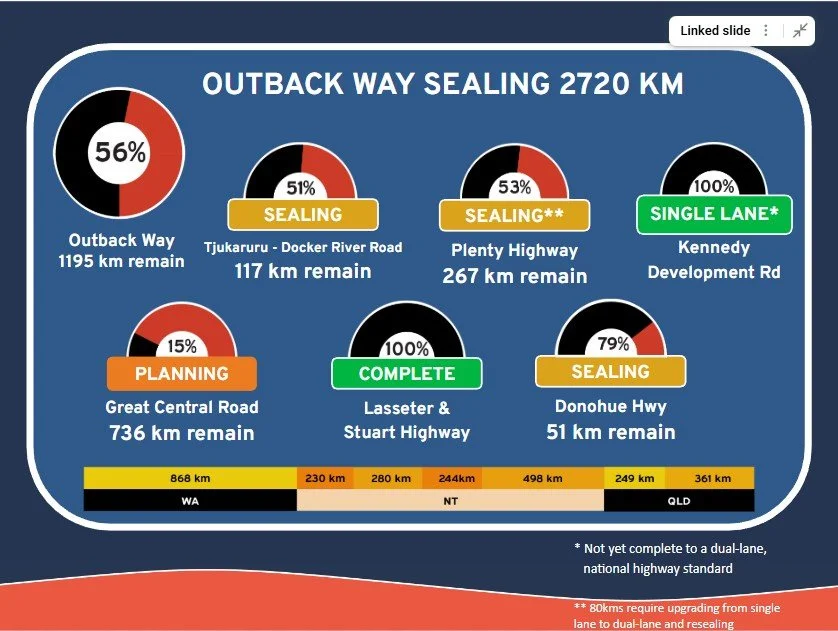AUSTRALIA’S LONGEST SHORTCUT
From Laverton, Western Australia to Winton, Queensland, via the Northern Territory’s Red Centre -
The Outback Way, carves a well-worn 2700km track through the heart of Australia.
SEALING DASHBOARD
Updated November 2025
our story
The Outback Way, when sealed will be Australia’s third transnational east to west road. Originally the vision of Patrick Hill, who in 1997 raised the idea and garnered support from all the Local Councils along the route. This led a motion from the floor of the Australian Local Government Association Conference. A motion that was in essence, to seal the existing roads and create the Outback Way.
The Outback Highway Development Council Inc. was formed in 1998 and the Alliance of Councils has continuously supported the development through both financial and in-kind support. The Organisation continuously lobby’s for the upgrade and promotes the benefits, including tourism that the sealing of the Outback Way will bring.
For the full story of the the first 25years of the Outback Way, head over to our online store and get yourself a copy of Bulldust to Bitumen.
ABC BACKROADS: 2 Episodes filmed on the Outback Way, available for viewing now:
Northern Goldfields Economic & Investment Prospectus
Discover the key projects and opportunities shaping one of WA’s most dynamic regions. The Prospectus provides an overview of economic growth and regional development potential of the region —highlighting why the Northern Goldfields is primed for sustainable, long-term investment.
OUTBACK STORE
OUTBACK WAY TRAVel JOURNAL & Paper MAp - NOW ON SPecial AS WE WORK ON AN UPDATED EDITION of the travel journal
$17.39
PAPER MAP
$5
book
$35
& WORLDS LONGEST GEOCACHE
Outback Way visitors can enjoy searching for the 45 treasure boxes hidden along the Outback Way – Geocache Trail. The ‘Treasure Hunt’ requires a handheld GPS to find the ‘treasure’ hidden at a given latitude / longitude coordinate. The ‘treasure’ is usually a small cannister box that contains a few trinkets and a notebook. You take a trinket out, put a trinket in, and sign the note book – if you choose, you can register your find at geocaching.com. We have a geocache starter kit available in our shop.
Follow us on FACEBOOK
Contact Us
From across The Outback Way we acknowledge the Koa People, Pitta Pitta People, Kalkadoon People, Yulluna People, Yalarrnga People, Bularnu Waluwarra Wangkayuju People, Wangkamahdla People, Arrente Nation, Anangu People, Yarnangu People, Wankatja People as traditional custodians and recognise any other people or families with connection to the lands.
We acknowledge and respect their continuing culture, their connection to land, waters and community, and the contribution they have made and continue to make to the region that The Outback Way traverses.









